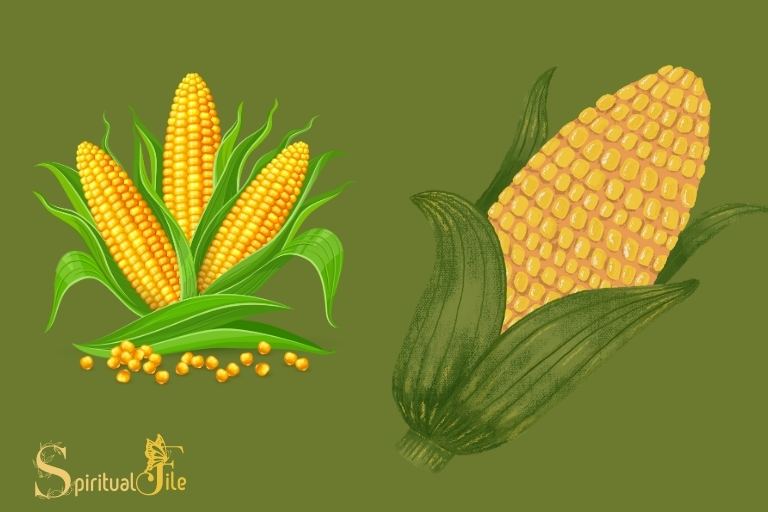What Does Corn Represent Spiritually? Fertility!
Corn represents spirituality, abundance, fertility, and growth in many cultures and belief systems.
Spiritually, corn holds a significant place in various traditions and mythologies because of its importance as a staple crop for many ancient civilizations.
It is often associated with the earth’s ability to provide sustenance and nurturing, as well as the cycle of life, death, and rebirth.
Corn’s spiritual significance can be observed in various cultural rituals and ceremonies, such as the Native American Corn Dance, which celebrates the cycle of life and the earth’s bounty.
The symbolism of corn also extends to the Thanksgiving holiday, where it is often used as a decorative element to represent the harvest and the importance of giving thanks for the abundance that the earth provides.
6 Symbolic and Spiritual Representations of Corn
| Culture / Religion | Spiritual Significance of Corn |
|---|---|
| Native American | Fertility, life, sustenance, and abundance |
| Aztec | Connection to the sun god, Huitzilopochtli, and the giver of life |
| Mayan | Creation myth, humans created from corn dough |
| Inca | Gift from the god Viracocha, symbol of life and abundance |
| African Traditional Religions | Connection to ancestors, symbol of prosperity and well-being |
| Christianity | General connection to blessings, harvest, and thanksgiving |
Key Takeaway

Four Fascinating Spiritual Meanings of Corn
Origin And History Of Corn In Spiritual Rituals
Corn, also known as maize, is a dominant crop that has been cultivated for thousands of years by many civilizations. It is considered a staple food in many cultures and is also an important symbol of spirituality.
In this blog post, we will delve into the spiritual significance of corn and explore its use in various spiritual practices.
Corn And Its Role In Indigenous Religions
Corn has been a sacred symbol in many indigenous religions for centuries.
Here are some key points to consider:
- Corn is considered a gift from the gods in many native american cultures and is used in various spiritual practices.
- It is believed that the great spirit, the supreme deity in many native american religions, taught indigenous people how to grow and cultivate corn.
- Corn is a vital part of many spiritual ceremonies and is believed to have the power to connect people with their ancestors and the spiritual world.
- In many ceremonies, corn is used as an offering to the spirits to show respect and gratitude.
Significance Of Corn In Ancient Spiritual Practices
In many ancient cultures, corn was not just a source of food, but also held deep spiritual significance.
Here are some key points to consider:
- In ancient mayan culture, corn was believed to be a gift from the gods, and the people were created from corn
- In ancient egyptian culture, corn was associated with the god osiris and was considered to be a symbol of resurrection and eternal life.
- Corn was also an important symbol in ancient greek and roman mythology. In greek mythology, demeter, the goddess of agriculture, was associated with corn.
- In hinduism, corn is associated with the goddess annapurna, the goddess of food, nourishment, and abundance.
Corn has been a significant symbol in various spiritual practices, and its deep-rooted history and spiritual significance make it an important aspect of many cultures.
It is truly an embodiment of the blessings that nature has to offer.
Corn Symbolism Across Cultures And Religions
Corn symbolism across cultures and religions:
Corn is one of the most widely cultivated and essential crops in the world, consumed by humans and livestock. However, it also holds great spiritual significance in various cultures and religions across the world.
Let’s explore the corn symbolism in christianity, african traditional religions, and native american religions.
Corn Symbolism In Christianity
Corn holds an essential symbol in christian traditions, representing the cycle of life, death, and resurrection. As a seed, corn is planted, dies, and then resurrects to produce a new life, just like jesus’s resurrection.
Some key points of corn symbolism in christianity include:
- Corn symbolizes the multiplication of christ’s teachings. When the seed is planted, it multiplies itself to produce many fruits, which represents the spread of christ’s teachings throughout the world.
- Corn is a symbol of christ’s body. When the grain dies and comes to life, it represents the resurrection of the body.
- Corn is also a reminder of god’s provisions. It is a significant crop for sustenance, and its symbolism shows how god provides for all our needs.
Corn Symbolism In African Traditional Religions
Corn holds deep cultural and spiritual roots in african traditional religions, specifically in west african cultures. Its significance includes fertility, prosperity, and sustenance.
Here are some key points of corn symbolism in african traditional religions:
- Corn represents fertility and the continuity of life. It is associated with the goddess of fertility and agriculture, providing hope for new life and growth.
- Corn also symbolizes prosperity and wealth, as it is a vital crop for sustainability in many african cultures.
- Corn is used in many traditional ceremonies and rituals where it stands as a sacred offering to the gods and ancestors, asking for blessings and protection.
Corn Symbolism In Native American Religions
Corn is considered a sacred plant for many native american tribes, representing the circle of life, growth, and connection to the earth.
Here are some of the key points of corn symbolism in native american religions:
- Corn is associated with the creator and sustainer of life, providing nourishment and spiritual energy for the native american tribes. It is a reminder of the connection between human beings and nature.
- The different colors of corn represent various spiritual meanings. Yellow corn represents life, blue corn for spiritual energy, red corn for love, and white corn for purity.
- Corn is a significant plant and a symbol of harvest for many native american tribes. It is essential for religious ceremonies, and its symbolism represents the spiritual and physical sustenance of native american communities.
Corn holds significant spiritual symbolism in various religions and cultures across the world. It represents fertility, prosperity, growth, and sustenance, reminding us of our connection to nature and the divine.
Interpretations And Meanings Of Corn Symbolism
Corn has been a significant spiritual symbol for several centuries, with its significance varying from culture to culture.
From being an essential staple food for various ethnic groups across the world to representing a sense of abundance, corn stands true as a symbol of life, fertility, and prosperity.
In this blog post, we’ll explore the different interpretations and meanings of corn symbolism, with emphasis on corn’s symbolism as a source of protection and nourishment, as well as its relevance as a depiction of fertility and abundance.
Corn As A Symbol Of Protection And Nourishment
Corn’s significance as a life-sustaining crop has earned it the symbolism of providing life forces and protection to many people all over the world, past the religious, social, and cultural lines.
Here are some of the important points to note about corn representing protection and sustenance:
- Corn is among the staple foods consumed by a majority of the world’s population, and it provides much-needed nutrients such as fiber, vitamins, and minerals.
- In native american cultures, corn is considered a ‘gift from the gods’ that can protect and nourish people, which is why it’s traditionally used in rituals and ceremonies.
- Corn is a resilient crop that is resistant to drought and other harsh weather, symbolizing its ability to protect people from harm and provide for them in times of need.
- Corn also represents the cycle of life and death, with its kernels dying and then reviving into new life, signifying its ability to nourish and sustain people through difficult times.
Corn As A Symbol Of Fertility And Abundance
Corn has long been associated with fertility and abundance, with many cultures seeing it as a representation of prosperity and good fortune.
Here are some essential points to remember about corn symbolizing fertility and abundance:
- The abundant growth of corn plants, with their tall stalks and multiple ears, represents an abundant harvest, thus symbolizing abundance and prosperity.
- In greek mythology, corn is denoted to demeter, the goddess of agriculture, fertility, and harvest.
- Corn’s high yield and ability to regenerate itself are seen as symbols of virility, fertility, and creativity across many cultures.
- In numerous african communities, corn is regarded as the ultimate symbol of fertility and abundance. It is also presented during weddings and various other significant ceremonies to signify the couple’s future prosperity and fruitfulness.
Corn’s symbolism as a source of nourishment and protection, fertility, and abundance runs deep within different cultures worldwide.
As such, it serves as an essential reminder of the significance of crop cultivation and the blessings that nature can offer.
Corn In Modern Spiritual Practices
Corn, also known as maize, is an essential staple food in many cultures worldwide. However, it also carries a spiritual significance in various religious and cultural practices.
Corn is not just a simple food item, but it is an essential part of many modern spiritual practices.
In this blog post, we will explore the spiritual significance of corn and how it is incorporated into various modern spiritual practices.
Incorporating Corn In Modern Spiritual Practices
Corn has long been used in spiritual practices across the world. Corn is a symbol of fertility, abundance, and life, and it is used to connect with the spirit world.
Below are some ways that modern spiritual practices incorporate corn:
- Corn dollies: These are handmade dolls made with braided corn husks. In wiccan and pagan cultures, corn dollies are believed to bring fertility, abundance, and good luck. They are often placed on altars or hung in homes to bring in the energy of the harvest.
- Corn offerings: In many native american cultures, corn is offered to the gods and spirits as a symbol of gratitude and respect. Corn is often placed on altars or used in ceremonies to honor the harvest and the natural world.
- Spiritual cleansing: In hoodoo and other african-american spiritual practices, cornmeal is used to cleanse the body and home of negativity and bad energy. Cornmeal is sprinkled around the house or placed in a bowl under the bed to absorb negative energy.
- Corn correspondences: In modern witchcraft and pagan traditions, corn is associated with the element of earth and the goddesses demeter and ceres. Corn is used in spells and rituals related to abundance, fertility, and growth.
The Role Of Corn In Modern Witchcraft Practices
Corn has a significant role in many modern witchcraft practices. Corn is an excellent representation of the earth element due to its origins and associations with fertility, growth, and abundance.
Below are some ways corn is used in modern witchcraft:
- Altar decorations: Corn is often used as altar decoration during the autumn equinox, also known as mabon. It is placed on altars to honor the harvest and the changing of seasons.
- Spellwork: Corn can be used in various spells related to fertility, abundance, and prosperity. For instance, witches can create corn poppet spells for fertility, use corn in abundance spells, or to represent the fertility of the goddess.
- Corn correspondences: Corn is associated with the third eye chakra, the planet venus, and the element earth in witchcraft. Witches often incorporate these associations into their spellwork or meditation practices.
Corn holds a significant spiritual significance in modern spiritual practices, such as witchcraft or native american cultures. Corn has become more than just a staple food item, but a symbol of fertility, abundance, and life.
Its use in modern spiritual practices is a testament to its enduring symbolism and cultural importance.
How Does Corn Represent Fertility in Spiritual Practices?
Corn holds significant spiritual symbolism in many cultures, representing fertility in spiritual activities Maui inner peace. In indigenous traditions, corn often symbolizes abundance and the cycle of life, connecting with the earth’s nurturing power. Its golden color and connection to sustenance make it a potent symbol of fertility and prosperity.
FAQ About Corn Represent Spiritually
What Does Corn Symbolize Spiritually?
Corn symbolizes prosperity, life, fertility, and transformation in various cultures worldwide. It also represents the abundance of blessings from the spiritual world.
How Is Corn Connected To Gods And Goddesses?
Corn is believed to be a sacred gift from gods and goddesses. In many ancient cultures, corn was worshipped as a deity and was considered the embodiment of many gods.
What Are Some Cultural References To Corn?
Corn has spiritual significance in many cultures worldwide, including navajo, mayan, aztec, and cherokee. Some cultures believe that the corn plant has healing properties.
Why Is Corn Used In Spiritual Rituals?
Corn is used in spiritual rituals to symbolize the cycle of life and to connect with the spiritual world. Corn has a strong spiritual connection and is believed to hold immense power.
What Is The Significance Of The Corn Harvest?
The corn harvest is of great significance in many cultures. It represents the bounty of the earth and is seen as a time to give thanks to the spiritual world for the abundance of blessings.
Conclusion
Overall, corn holds a significant spiritual meaning across different cultures and religions. From the native americans to the african tribes, corn has been utilized as a symbol of life, fertility, and abundance.
The spiritual significance of this crop goes beyond its physical uses and speaks to a deeper spiritual connection with nature and the world around us.
Whether it is used in ritual ceremonies or as a representation of the divine, corn remains a powerful symbol of connectedness and renewal.
So, the next time you encounter corn in your life, take a moment to reflect on its spiritual significance and let it serve as a reminder of the power and beauty of the natural world.
May we all strive to live in harmony with nature and embrace the spiritual meaning behind the things we consume in our daily lives.






